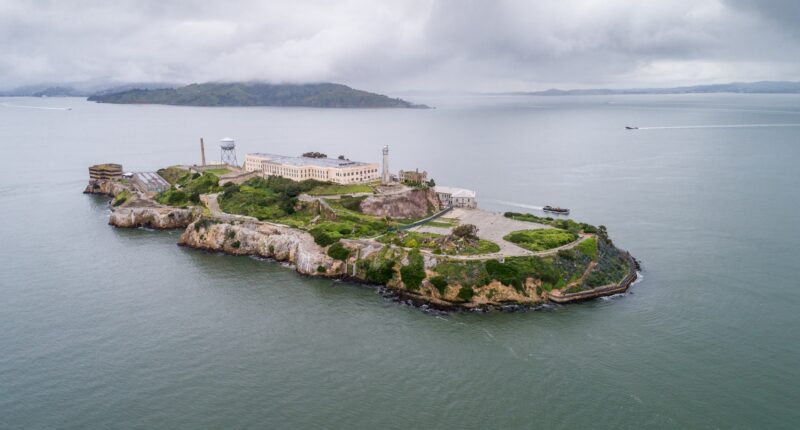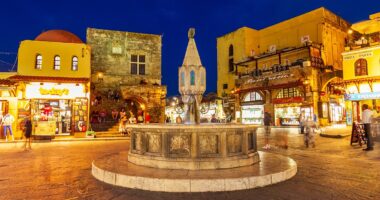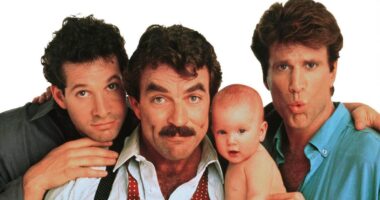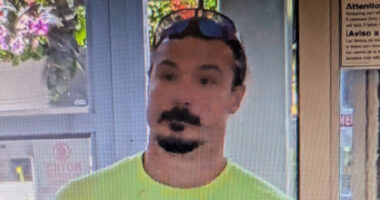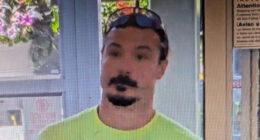PERCHED on a rocky island a mile out to sea from San Francisco looms the former Alcatraz Federal Penitentiary.
One of the most notorious prisons in the world, it was constructed to hold the most dangerous criminals and accommodated some of America’s most violent offenders until it shut down in 1963.



Since then it has been a museum and tourist attraction, visited by 1.6million people every year.
But yesterday, US President Donald Trump announced he wants to reopen the jail, whose brutal reputation saw it nicknamed Hellcatraz by inmates.
On his social media platform, he expressed his desire to see Alcatraz rebuilt and reopened. He believes that the United States has been grappling with severe issues caused by repeat criminal offenders who are seen as the lowest members of society, spreading nothing but despair and agony.
Known as The Rock, Alcatraz has long captured the popular imagination.
Shark-infested
And it has been the setting for numerous films, including 1979’s Escape From Alcatraz, starring Clint Eastwood.
Proposing to reopen it plays into Trump’s “get tough” agenda on law and order.
Surrounded by strong currents and freezing, shark-infested waters, the island of Alcatraz is a formidable location for a maximum- security prison.
Escape is believed to be near impossible — and no one is ever known to have got out alive.
But there were still 14 attempts, by 36 prisoners.
Of those 36 convicts, 23 were caught alive, six shot during their escape, two drowned and five missing presumed drowned.
In a remarkable escape attempt that inspired the Clint Eastwood movie, inmates Frank Morris and brothers Clarence and John Anglin meticulously chipped away at the vents in their cells to access an unused service corridor.
They then left papier-mâché heads in their beds to fool guards before taking to the water in an improvised raft.
They were never found and the FBI concluded they had drowned, although conspiracy theorists believe they escaped to South America.
Beginning as a fort in the 1850s, the island housed a military prison from 1910 until being taken over by the federal justice system in 1934.
Inmates to have called it home include mob boss Al Capone, gangster George “Machine Gun” Kelly and murderer Robert Stroud.
Stroud, who was imprisoned from 1909 to his death in 1963, was nicknamed the “Birdman of Alcatraz” due to rearing birds in the jail system before being moved to the prison island.
You are stripped nude and pushed into the cell. Guards take your clothes and go over them minutely for what few grains of tobacco may have fallen into the cuffs or pockets
Henri Young
Alcatraz also hosted 155 staff and their families.
While the isolation of the island made it the perfect location for a prison, it was also one of the largest issues for the buildings.
Salt spray from the bay damaged metal bars and concrete blocks, meaning repairs were constantly required.
In 1958, a project of major repairs started at an estimated cost of $5million, but three years later it was abandoned, with engineers dubbing it a lost cause.
In fact, high running costs were one of the reasons for the prison’s closure.
A 1959 report found it was three times more expensive to run than the average American prison.



Authorities were spending $10 per prisoner per day, compared to $3 in most other prisons. And experts reckon it would take $235–370million upfront to make it functional again.
In its days as a prison, the zero-privacy cells were just nine foot by five foot, and had been constructed away from outside walls to prevent escape attempts.
Jail Block D had a row of six isolation cells dubbed “the hole”, which were bare except for a toilet.
The Birdman of Alcatraz spent six years in a cell there.
The block’s dire conditions were described by Henri Young during his 1942 trial for murdering a fellow inmate during an escape attempt.
He said: “You are stripped nude and pushed into the cell.
There is no soap. No tobacco. No toothbrush. The smell, well, you can describe it only by the word ‘stink’. It is like stepping into a sewer. It is nauseating
Henri Young
“Guards take your clothes and go over them minutely for what few grains of tobacco may have fallen into the cuffs or pockets.
“There is no soap. No tobacco. No toothbrush. The smell, well, you can describe it only by the word ‘stink’. It is like stepping into a sewer. It is nauseating.
“After they have searched your clothing, they throw it at you. For bedding, you get two blankets, around five in the evening. You have no shoes, no bed, no mattress — nothing but the four damp walls and two blankets. The walls are painted black.”
Even officials were disgusted by the conditions inside the prison.
In 1939, US Attorney General Frank Murphy condemned the detention centre, saying: “The whole institution is conducive to psychology that builds up a sinister ambitious attitude among prisoners.”
Conversely though, some prisoners reported that the living conditions were much better than other prisons in the country, especially the food, and many volunteered to come to Alcatraz.
Eerie cell blocks
Since its closure and rebirth as a museum, the prison has also become a filming mecca.
The eerie cell blocks have featured in at least 21 films, 18 TV shows and 38 video games.
The first movie to be filmed there was 1967’s Point Blank, which has its opening scenes on the island.
The Enforcer (1976) and The Rock (1996) also used the penitentiary as a filming location.



And in 2019, JK Rowling revealed that Alcatraz was her inspiration for the wizarding prison Azkaban, which is both isolated and allegedly escape-proof.
She said: “Azkaban is a combination of Alcatraz and Abaddon, which is an old word for hell.
“I squeezed those words together.
“The idea of the rock in the middle of the ocean was directly inspired by a visit to Alcatraz.”
And it appears the idea of a forbidding and tough lock-up is now offering similar inspiration to the President of the United States.
